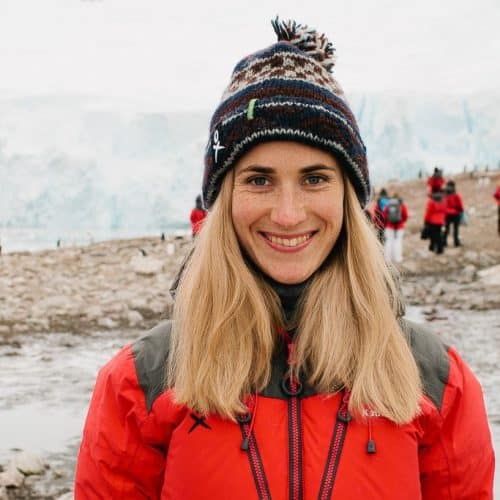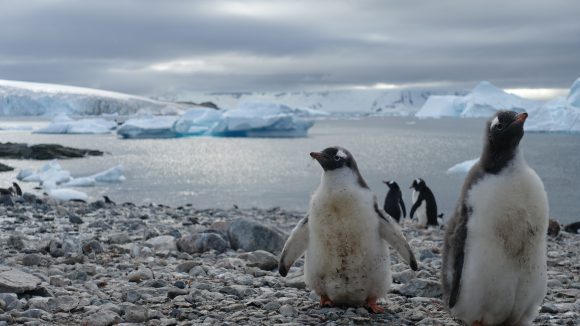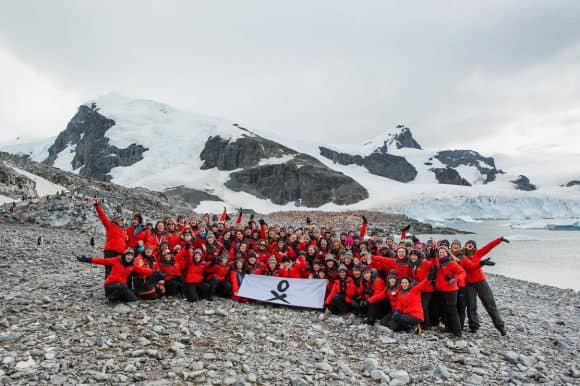By Cecile Godde, PhD student at the University of Queensland, Australia and former IIASA YSSP participant

Cecile Godde ©Oli Sansom
Last year, I had the fantastic opportunity to spend three months at IIASA as part of the Young Scientists Summer Program (YSSP), to collaborate with the Ecosystems Services and Management (ESM) research program. During this very enriching experience, both intellectually, socially, and culturally, I worked with Petr Havlik, David Leclère, and Christian Folberth on modeling global rangelands and pasturelands under farming and climate scenarios. I also progressed on the development of a global animal stocking rate optimizer. The overall objective of this YSSP project, and more broadly of my PhD, is to assess the role of grazing systems in a sustainable food system.
However, my trip to IIASA was not my only adventure last year. Just before moving to Vienna, I received the great news that I was selected along with 77 other women to take part in a women in science and leadership program called Homeward Bound.
What would our world look like if women and men were equally represented, respected, and valued at the leadership table? How might we manage our resources and our communities differently? How might we coordinate our response to global problems like food security and climate change?
Homeward Bound is a worldwide and world-class initiative that seeks to support and encourage women with scientific backgrounds into leadership roles, believing that diversity in leadership is key to addressing these complex and far-reaching issues. The program’s bold mission is to create a 1000-strong collective of women in science around the world over the next 10 years, with the enhanced leadership, strategic, and visibility capacity to influence policy and decision making for the benefit of the planet.

Antarctic penguins © Cecile Godde
This year-long program culminated in an intensive three-week training course in Antarctica, a journey from which I have just come back. The voyage to Antarctica was incredible. We learnt intensively during this 24/7 floating conference in the midst of majestic icebergs, very cute penguins, graceful whales, and extraordinary women from various cultures and backgrounds, from PhD students to Nobel Laureates. I have returned full of hope for the planet, deeply inspired, and emotionally energized. It was a truly unforgettable experience, one that will keep me reflecting for a lifetime.
Our days in Antarctica typically followed a similar routine – half of the day was dedicated to a landing (we visited Argentinian, Chinese, US, and UK research stations) and the other half to classes and workshops. We discussed systemic gender issues and learnt about leadership styles, peer-coaching, the art of providing feedback, science communication, core personal values, or what matter to us. The list goes on! We were also encouraged to practice reflective journaling. Regularly recording activities, situations, and thoughts on paper is actually a very powerful technique for self-discovery and personal and professional growth as it helps us think in a critical and analytical way about our behaviors, values, and emotions. We also spent quite some time developing our personal and professional strategies: What is our purpose as individuals? What are our core values, aspirations, and short- and long-term goals? From that, we developed a roadmap that could be executed as soon as we stepped off the ship. While I haven’t solved all my life’s mysteries, this activity gave me strong foundations to keep growing and actively shape my own life, rather than letting society do it for me.
In the evenings, we watched our film faculty sharing their tips with us on television, including primatologist Jane Goodall, world leading marine biologist Sylvia Earle, and former Executive Secretary of the UN Framework Convention on Climate Change (UNFCC), Christiana Figueres. We also had a collective art project called “Confluence: A Journey Homeward Bound”, which was underpinned by our inner journey of reflection, growth, and transformation and our outer physical journey to Antarctica.

Homeward Bound in Antarctica © Oli Sansom
Both my stay at IIASA and my journey to Antarctica taught me a lot about the value of getting out of my comfort zone, exploring different leadership styles, and collaborating. I have also witnessed how visibility (visibility to ourselves, to understand who we are, and visibility to others, to let the world know we exist) helps to open up opportunities. The good news is that the beliefs we have about ourselves are just that – beliefs – and these beliefs can be changed.
My visibility to others has also increased notably in relation to my involvement in Homeward Bound and my recent award of the Queensland Women in STEM prize. This Australian annual prize, awarded by the Minister for Environment and Science, Leeanne Enoch and Acting Chief Scientist Dr Christine Williams, aims to celebrate the achievements of women who are making a difference in the fields of science, technology, engineering, and mathematics. As a result, I have been contacted by fascinating people from various fields of work, from researchers and teachers to entrepreneurs, start-ups, and industries. All these connections have broadened my approach to food security and global change and helped me shape my research vision, purpose, and values.
When we were in Antarctica, our story reached 750 million people. Why? Because, and may we never forget, the world believes in us – ‘us’ in its broadest sense: humans, scientists, women, etc. – in our skill, compassion, and capability. While we are facing alarming global social, economic, and environmental challenges, I believe that the many collaborations that embrace diversity of knowledge, skills, processes, and leadership styles that are currently emerging all around the world, will help us get closer to our development goals.
Homeward Bound is a 10-year long initiative. Find out more about the program and how to apply here: http://homewardboundprojects.com.au
Follow my journey: –
- Website: https://cecile-godde.com
- Twitter: @CecileGodde
- ResearchGate
- Facebook: @CecileGoddeSTEM

You must be logged in to post a comment.